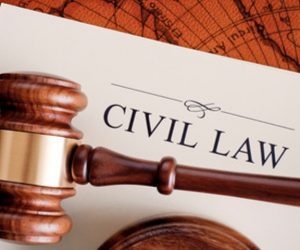 Given the amount of media coverage over the past few months, law enforcement officers face more scrutiny than at any time in history. Naturally, with all of this scrutiny, the number of civil lawsuits being filed against officers for both on and off-duty actions has also increased and is having a significant impact on their employment. With this in mind it is becoming increasingly important that law enforcement officers become aware of the potential for them to be held personally liable for any actions they take in the line of duty that could end with a personal lawsuit being filed against them.
Given the amount of media coverage over the past few months, law enforcement officers face more scrutiny than at any time in history. Naturally, with all of this scrutiny, the number of civil lawsuits being filed against officers for both on and off-duty actions has also increased and is having a significant impact on their employment. With this in mind it is becoming increasingly important that law enforcement officers become aware of the potential for them to be held personally liable for any actions they take in the line of duty that could end with a personal lawsuit being filed against them.
Law Enforcement Officers and Personal Civil Liability
The concept of personal liability for police officers refers to the idea that an officer can be considered civilly liable for any actions they take within the realm of their position. There are, in fact, a number of legal theories in which an officer can become the defendant in a civil lawsuit. These may include, but not be limited to; intentional injuries also known as torts as well as pursuant to 42 U.S.C. § 1983.
Lawsuits filed under 42 U.S.C. § 1983 are considered to be the most common filed against police officers as they can be filed against any officer who has been accused of violating a person’s statutory or constitutional rights as described by law. These filings are typically called a “Bivens action” in reference to the case of Bivens v. Six Unknown Agents, 403 U.S. 388 (1971).
Among the most common examples of this are:
• Cases of alleged false arrest
• Cases of alleged malicious prosecution
• Cases of alleged use of excessive force
• Cases of alleged failure of an officer to intervene when another officer is engaged in some form of unlawful action
Today, when a police department or federal law enforcement agency faces a civil lawsuit regarding one of their officer’s actions, the individual police officer is also named in the suit. In most cases, the main target of the plaintiff’s attorney is the particular department in question because they have the ability to pay any type of large settlement, but at the same time, the officer also becomes a target of the lawsuit. This can cause an undue amount of stress for the officer.
The Good News
The good news for the law enforcement officer named in the suit is that in most cases when an officer is named in the suit, the case itself is dismissed because law enforcement officers are afforded a certain amount of immunity. The average officer also lacks the ability to pay any type of larger settlement out of their own pockets. But, this does not seem to help relieve the stress of being named in such suits.
The courts, however, are very aware of this situation and tend to give officers a high level of deference, which in many cases make them immune to this type of suit. Those that you do see in the news are the ones in which this type of deference is not brought into play.
In most cases, the government will step in to defend an officer who is named in a civil lawsuit. Most Federal, state and local agencies have their own regulations in place that require them to provide legal representation for any officer who is accused of misconduct. However, these regulations may vary from agency to agency and may lead to the state or locality representing the officer and the agency at the same time to help avoid making the case any more complicated than it already is. On top of this, in the event the government makes the decision to settle the case, they will require the plaintiff to sign a full release against the officer and the government.
Private Insurance
It is highly recommended that law enforcement officers consider purchasing a private insurance policy designed to cover them in the event they need to hire an attorney for this type of civil lawsuit. The policy should not only cover the cost of legal defense, but also any settlement or judgment. It is your job as a law enforcement officer to ensure you are properly protected and that you fully understand your personal liabilities and the issues you face as a member of law enforcement.
